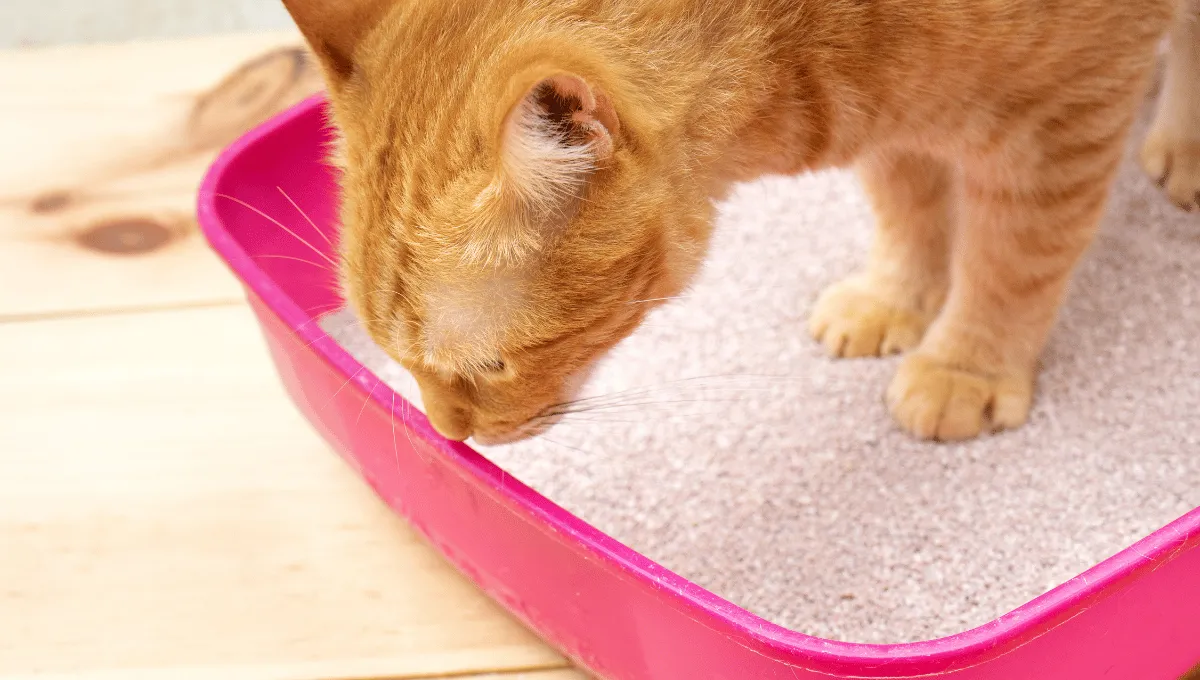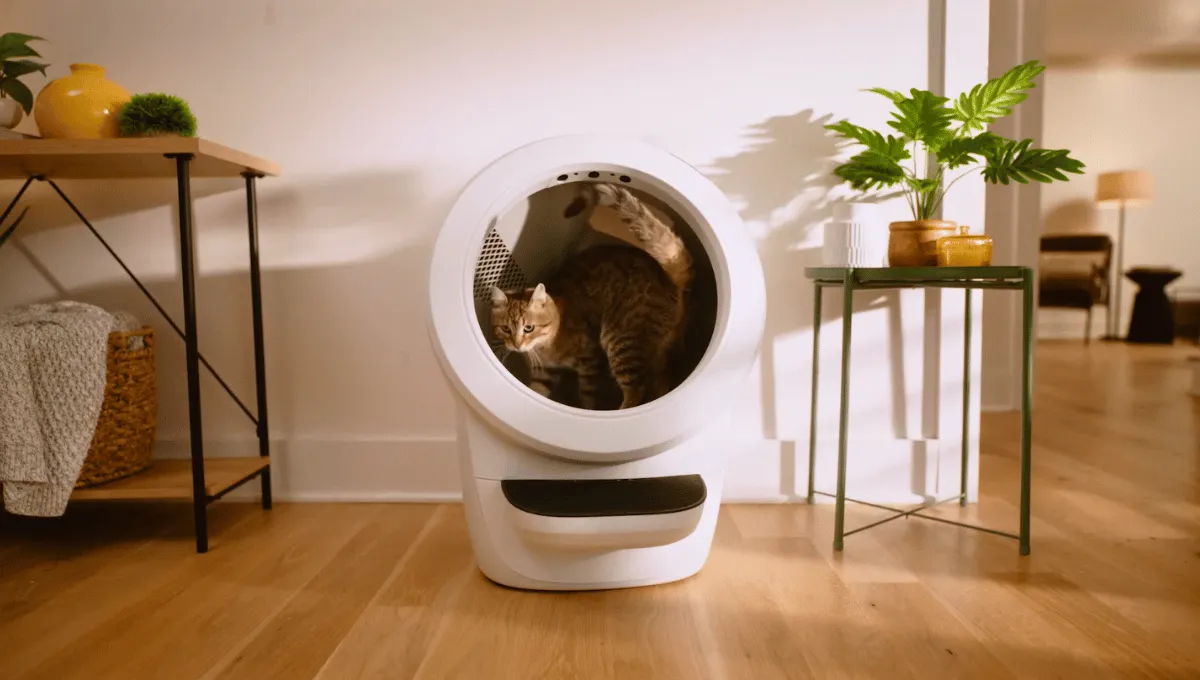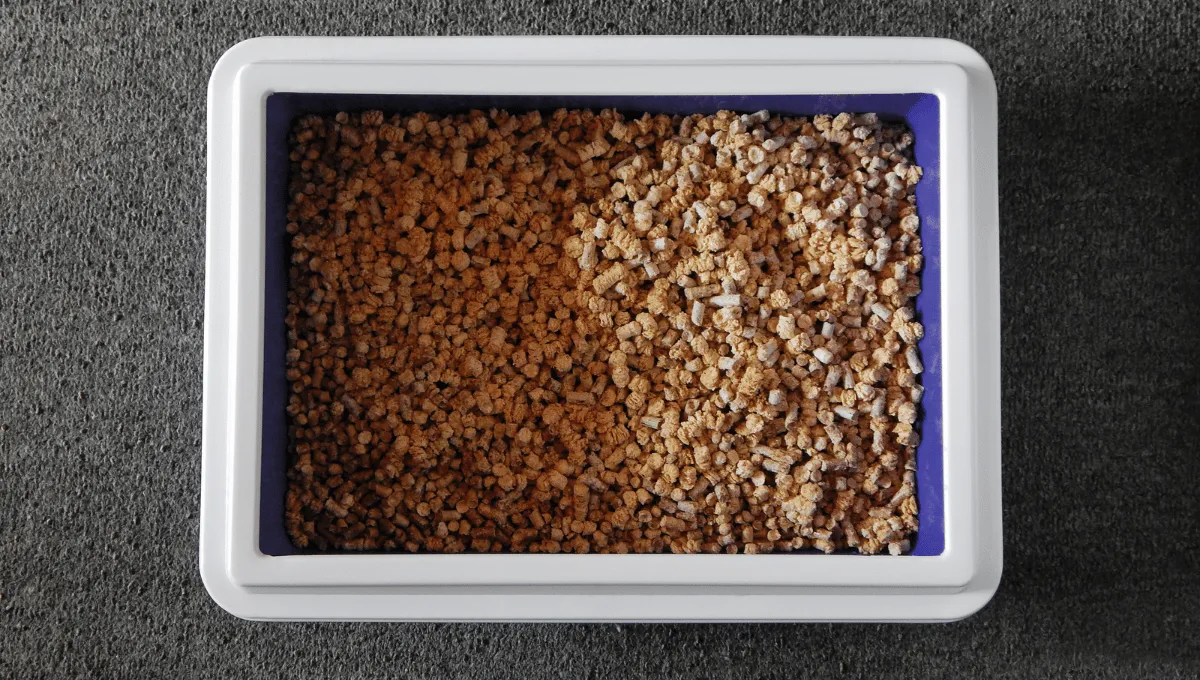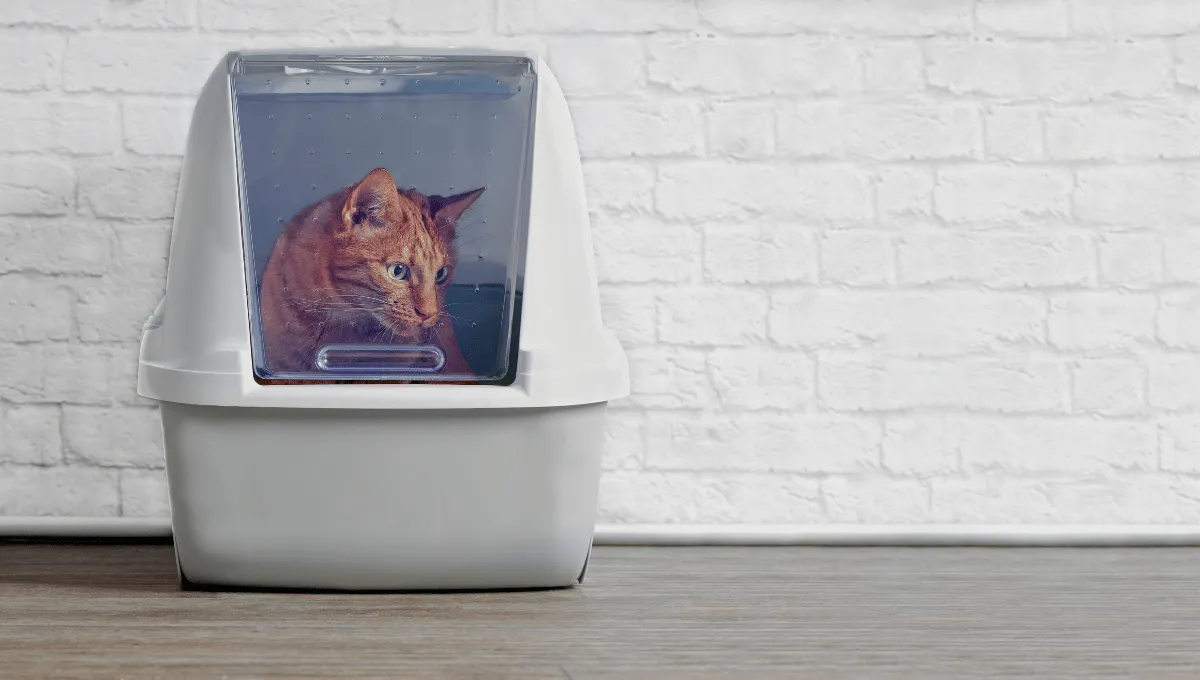As a cat owner, you may have witnessed your feline friend playing with their litter box! Though strange to humans, this act is not unusual in feline behavior.
It can be as simple as wiggling in place for a few seconds, sometimes purring or showing other signs of happiness. However, it can leave pet parents puzzled and concerned.
Understanding why cats exhibit this behavior is important, as it can indicate various reasons. This knowledge helps you assess your cat’s physical and emotional health.
Some unique behaviors exhibited by felines are as varied as the cats themselves, ranging from playful actions to potential health complications. By identifying these causes, you can better understand your feline friend and address their issues.
Why Cats Roll in Their Litter Boxes?
Cats engage in many normal behaviors while using the litter box, which is attributed to instinct and inherent behavior.
Most of these actions can be quite bewildering to owners, but they are significant to your cat. Let’s explore some common reasons why cats might roll in their litter boxes:
1. Scent marking
Cats are solitary animals with a unique ability to communicate with each other through their sense of smell. When your cat rolls in the litter box, they are likely scenting the area to mark it.
Cats have glands located on their cheeks, paws, and flanks. When they roll in the litter, they intend to spread their scent everywhere to claim the area as their own.
This behavior is most commonly seen in multi-cat households or in homes that have recently undergone changes.
The litter box is one of the most important areas in the house that a cat feels belongs to them. This might be why your cat begins marking the litter box with their urine.
It’s their way of saying, “This is my comfort zone, and I feel safe here.”
2. Comfort and enjoyment
In most cases, cats enjoy rolling in the litter box, similar to how people like rolling around on the floor. The texture of the litter can be enjoyable for some cats, much like rolling on a soft carpet or grass.
Moreover, the litter’s smooth texture can appeal to them, especially because it has a cool, granular surface that might feel nice against their fur.
This can be a self-comforting behavior or a way your cat finds relaxation. Do not rush to conclusions if your cat looks happy and purrs while rolling in clean litter.
It’s simply the cat enjoying herself. It is a feline’s way of having a spa treatment, with the litter acting as the massage pad.
3. Dust bathing
Cats are known to roll in dust in their environment to groom themselves. It is instinctual and helps them rid their bodies of natural oils, which can promote healthier skin.
Your cat may engage in a similar grooming process in their litter box, especially when they cannot access outdoor spaces.
Dust bathing is beneficial for cats for various reasons. It helps them distribute natural oils across their coat, shed fur and skin, and even reduce the presence of parasites.
It might seem illogical that rolling in litter could be a cleaning action, yet cats are programmed to groom themselves this way.
4. Curiosity and play
Young cats, especially kittens, are playful creatures, and the litter box is one of the things they can play with and explore. The texture and movement of the litter can appeal to young cats, driving them to paw, dig, and roll in it.
This behavior is usually harmless and tends to decrease as the cat matures into adulthood. It is part of a learning process where they understand their surroundings and develop their motor skills.
For kittens, the litter box can be one of the most stimulating and physically engaging items in a limited environment that encourages exploration and play.
Medical Reasons
Although it is perfectly natural for cats to roll in the litter box, knowing that it can be a sign of other health problems is essential.
Knowing when this behavior indicates a medical issue can assist in early diagnosis for your cat. Let’s explore some potential medical reasons for this behavior:
1. Skin irritations or allergies
Cats that experience skin rashes or allergies may display unwanted behaviors, such as rolling in the litter box to soothe themselves.
The texture of the litter is coarse, and as we all know, scratching is something cats frequently do, so the litter can help with that as well.
This behavior might be even more noticeable if your cat has developed an allergy to something in their environment or food.
It is also important to look for other symptoms, such as over-grooming, skin rashes, or the formation of small pimples on the skin.
If these symptoms are accompanied by constant rolling in the litter box, it is wise to seek your vet’s advice.
They can determine the cause of the itching and provide medical management to treat your cat’s skin condition.
2. Urinary tract issues
Occasionally, changes in a cat’s behavior towards the litter box can indicate certain conditions affecting the urinary tract.
Cats experiencing urinary tract infections, bladder stones, or feline interstitial cystitis may display unusual behaviors, including rolling in the litter box.
These actions might provide some relief from discomfort or signal a problem with urination.
Watch for other signs, such as frequent visits to the litter box, dragging the hind legs, or vocalizing while using the box.
If these signs are present along with rolling behavior, you should take your pet to the veterinarian immediately.
Urinary problems can escalate quickly in cats and should be addressed promptly with a veterinarian’s assistance.
3. Parasites (fleas, mites)
Fleas or mites are external parasites that can cause significant itching in cats, prompting them to roll in the litter.
The physical nature of the litter can help scratch itchy areas, such as those affected by fleas in the fur. This behavior may be more noticeable if the infestation is concentrated around the back or base of the tail.
Examine your cat for fleas by looking for flea droppings, which appear as small black specks in the fur. Mites can cause your pet to lose hair in specific areas or develop scaly skin.
If you suspect that your cat has parasites, you should seek help from a veterinarian to get the proper treatment. This will eliminate the parasites and relieve your cat’s discomfort.
4. Neurological issues
In rare situations, rolling or unusual litter box activity may indicate a neurological issue in the cat’s brain or spinal cord.
Certain diseases or injuries affecting the nervous system can cause such behaviors, including odd movements or positions while defecating. This might involve rolling around or other bizarre activities your cat has never displayed before.
Look for any neurological signs such as disorientation, head tilting, or changes in pupil size.
If you observe these signs alongside abnormal litter box habits, it is crucial to consult your veterinarian.
Neurological disorders are complex, and a proper diagnosis is necessary to ensure your cat receives the right treatment to improve its condition.
Behavioral Reasons for Rolling in the Litter Box
Before concluding that a medical condition is responsible for a change in a cat’s litter box behavior, psychological and social factors must also be considered.
Let’s explore some common behavioral reasons for rolling in the litter box:
1. Stress or anxiety
Cats are highly sensitive to stimuli, and any alteration in their environment or daily routine can cause stress.
When stressed, some cats seek comfort in objects, such as their litter box, as they feel overwhelmed.
Getting into the litter is comforting as they try to calm down in a place familiar with their scent and associated with routines.
Check for other indicators of stress and anxiety, such as a loss or increased interest in food, restless grooming, or attempts to hide. Your cat might roll in the litter box if you’ve recently changed its location, bought a small animal, or even introduced a new roommate.
2. Territory marking in multi-cat households
The rolling in the litter box could indicate the cat’s dominance among multiple cats living in a household.
This behavior is more apparent if some cats compete for food or shelter or a new cat has arrived. To prove ownership, when a cat rolls around in the litter, it says, “This is my space, and I’m marking it as such.”
Pay attention to any changes in the relationship between your cats. If there is tension or if one of the cats tends to stake a claim on the litter box, this could be the reason for the rolling behavior.
You should have the appropriate number of litter boxes (one per cat, plus one) within the home. This will help cut down on territorial behaviors and aggression.
3. Seeking attention
Some cats simply discover that doing particular things that seem strange to people will draw attention. If your cat has been rewarded in any way, shape, or form for rolling in the litter box, the cat will continue the action to get more of that reward.
This could be especially true if you’ve scolded, joked, or responded negatively to this behavior.
Think about how you responded when you witnessed this conduct. They have learned through positive reinforcement that rolling in the litter results in receiving more tasty treats, pats, or playtime from you.
To solve this, devise a daily routine time to attend to and play with them. Do not give them extra attention when they roll in the litter box.
When to Be Concerned?
Finding a litter box to roll in once in a while is normal. However, there are conditions where rolling can be related to health issues.
One factor to consider is the frequency of the behavior in question. When your cat spends more time in the litter box than usual, it can be a sign that something is wrong.
An increase in this behavior to high levels might indicate discomfort, stress, or a medical issue.
Observe how often your cat performs this behavior or if it disrupts the cat’s usual litter box habits.
Suppose the rolling becomes compulsive or interferes with your cat’s ability to use the litter box as intended. In that case, it is important to contact your veterinarian to rule out any medical issues.
How to Address the BehavioUr?
To effectively stop your cat’s litter box rolling behavior, here are some steps you can take. The first step is to maintain the cleanliness of the litter boxes.
Every cat is different, so you must feed and clean the box daily, deep clean it often, and provide litter that your cat likes.
Hygiene is important because it can help prevent excessive rolling and encourage proper litter box use.
Remove the scratching post and offer your cat toys or other items to keep them busy. This can serve their need for tactile experiences and reduce their litter box playfulness.
It is always a good idea to seek the help of a professional to determine whether the behavior is normal or if it requires the vet’s attention for your cat’s health.
Conclusion
Analyzing the possible reasons behind this behavior and paying attention to several aspects is necessary.
Even though such behavior can be expected due to innate reactions or just for fun, it can also be a sign of a problem.
By understanding the context, frequency, and signs accompanying this behavior, you will be better positioned to decide when intervention is appropriate.
Remember, every cat is different, and what is normal for one cat may not be for another. Nevertheless, the best thing to do concerning your feline companion is to seek advice from a veterinarian.
Drop me a comment if you need help in case your cat is still rolling in the litter box.
Until next time, Meow-Meow!






0 Comments